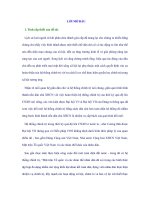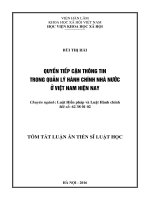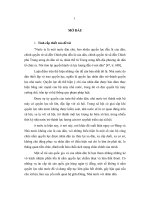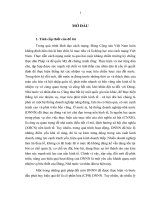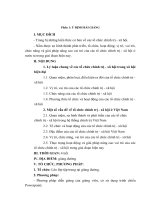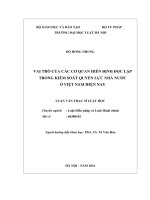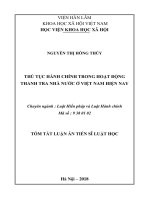Các tổ chức chính trị xã hội trong việc kiểm soát quyền lực nhà nước ở việt nam hiện nay tt tiếng anh
Bạn đang xem bản rút gọn của tài liệu. Xem và tải ngay bản đầy đủ của tài liệu tại đây (272.69 KB, 27 trang )
VIETNAM ACADEMY OF SOCIAL SCIENCES
GRADUATE ACADEMY OF SOCIAL SCIENCES
ANH TUAN NGUYEN
THE ROLE OF SOCIO-POLITICAL
ORGANIZATIONS IN CONTROLLING OVER
THE GOVERNMENT POWER IN VIETNAM
Major: Political Science
Major code: 9 31 02 01
SUMMARY OF DOCTORAL THESIS IN POLITICS
HA NOI - 2020
This dissertation is completed at: Graduate Academy of
Social Sciences
Name of Supervisors:
1. Prof - Dr.Sc Son Xuan Phan
2. Assoc.Prof - Dr Quang Xuan Ho
Referee 1: Assoc.Prof – Dr. Luu Van Quang
Referee 2: Chu Van Thanh
Referee 3: Assoc.Prof – Dr. Nguyen Thi Viet Huong
The dissertation will be defended by the Academy-level
Thesis Examination Committee met at the Graduate
Academy of Social Sciences at ...... hours ... minutes, on
day .... month…. year….
The thesis can be found at:
National library of Vietnam
Library of Graduate Academy of Scocial Siences
LIST OF REFERENCES RELATED TO THE THESIS
1. Ho Xuan Quang - Nguyen Tuan Anh (2018), The Party’s
awareness development on state power control, Political theory,
Vol.19-DEC 2018.
2. Nguyen Tuan Anh (2019), Effective monitoring of the exercise
of state power by the Vietnam Fatherland Front and socio-political
organizations in Vietnam today, Ho Chi Minh city Social Sciences
Review, No. 7-2019.
3. Nguyen Tuan Anh (2019), Situation and solutions to improve
the effectiveness of social criticism of the Fatherland Front and
socio-political organizations in Vietnam today, Vietnam Journal of
social science Manpower, No. 7 (74) 2019.
4. Nguyen Tuan Anh (2019), Discussion about the inevitability of
controlling the power of the state, Journal of Education and Society,
No. 101 (162)/8/2019.
5. Ho Xuan Quang - Nguyen Tuan Anh (2019), Issues in terms of
power control in process of building the Vietnamese tectonic
government, in Proceedings of “The 1st annual international
conference on sustainable development in the cantral Vietnam”, The
theme of 2019: “Building and operating an enabling government:
Current situations in Vietnam and experience of other nations”.
ABSTRACT
1. Urgency of this subject
The powers of government and the governance of these powers
are central to the political system of any country. Generally speaking,
powers of the federal government are one of the most basic tools to
sustain the order and the improvement of a society through ensuring
the national security derived from both external as well as internal
conflicts, to provide resources and community services which could
not be supplied by the individuals or society themselves.
Nevertheless, the government powers normally engage in twofaced issues. One is relevant to the necessary factors facilitating the
organization and administration of a society; on the other hand, they
also involve in the threats of deterioration which could result in the
government’s totalitarianism or authotarianism. Therefore, the
existence of government powers has to certainly associate with a
particular mechanism for controlling powers to ensure they are
utilised efficiently and purposely. In fact, a number of approaches are
viable to the governance of these powers, including internal political
system resided inside the government, or other systems that are
externally founded.
Among the organisations elected by the people, socio-political
organisations possess a lot of more competitive advantages to
effectively control the powers of the federal government. These
organisations are an integral part of a civil society, functioning as the
protector of all social classes and aiming at influencing the
government, changing the government’s policies that may be
beneficial to them backwardly.
The socio-political organisations in Vietnam have initially
indicated their contribution to engaging a greater participation of the
people in works related to the government, which facilitates a process
1
of transitioning the current model of government formation regarding
bureaucracy and centralisation of powers into a tectonic state.
However, these organisations are facing a huge number of
difficulties, challenges, along with limits associated with a massive
impact on their control over the government powers.
In response to the requirement of “continuously maintaining
democratic socialism, guaranteeing all powers belong to the people”
in a uniquely one-party system, researching on theories and practices,
which would latterly be based on to propose solutions to improving
controlling efficiency for the aforementioned socio-political
organisations, are highly required at the moment. In terms of that, the
author comes up with the topic of “The role of socio-political
organizations in controlling over the government power in
Vietnam” as the guiding light for this thesis.
2. Purpose and mission of this paper
2.1. Purpose
The purpose of this thesis is to clarify theoretical and practical
issues regarding control over the government’s powers of the existing
socio-political organisations. Based on that, some persepectives and
solutions so as to enhance the effectiveness of Vietnamese sociopolitical organisations’ administration of the aforementioned powers
in the current time would be proposed.
2.2. Mission
- This paper aims at systematising theoretical basis for controlling
powers of the government; gaining a deeper insight into these
existing socio-political organisations; into their roles, content and
effectiveness in control over the governement’s powers.
- Explorating how foreign socio-political organisations control
over the powers of their government would be utilised as the role
model for the case of Vietnam.
2
- This evaluates achievements, drawbacks, causes of limitations in
the act of controling the government power from Vietnamese sociopolitical organisations.
- Developing the established persepectives and solutions in order
to improve socio-political organisations’ efficiency in the
management of government power.
3. Target and scope of research
3.1. Target of the research
This dissertation targets at socio-political organisations’ issues
relevant to their control over government powers in Vietnam at the
moment.
3.2. Scope of research
3.2.1. Content scope: This research is undertaken to explore the
process of controlling over the government powers of the Vietnamese
socio-political organisations in terms of their roles, content, means,
legality and productivity.
3.2.2. Geographical scope: The specific region of this research is
limited to the country of Vietnam. Yet, this paper also leverages the
way of how other foreign socio-political organisations currently
performing in their countries of origin.
3.2.3. Time scope: This study is primarily based on the context of
the reform policy launched in Vietnam in 1986 known as ‘Doi Moi’.
4. Research questions and hypotheses
4.1. Research questions
- What is the control over the government powers? What is the
inevitability, content and the means of management of controlling the
government powers?
- What are the socio-political organisations? Which parts are they
playing in the act of controlling these government powers?
- How are the local socio-political organisations performing in a
3
comparison with other foreign organisations in terms of control over
the government powers?
- Within the specified context of Vietnam’s one-party system,
how essentially are these socio-political organisations currently
playing in the act of managing the powers of the government?
- What kind of perspectives or solutions need to be implemented
in order to enhance the effectiveness of these control over the
government powers currently?
4.2. Research hypotheses
- Socio-political organisations have an objective and integral role
in controlling government powers.
- In case the separation of powers within a government is not
utilised or in the absence of multiple parties is visible, the local
socio-political organisations’ role in monitoring the government
powers is not only objective but is also perceived as one of the most
important means of management of these powers.
- These organisations associate with massive abilities to
effectively control government powers.
5. Research methodology and approach
5.1. Research methodology
papper offers a main methodology based on dialectical
materialism and historical materialism. Moreover, this subject also
relies on the theoretical basis of Ho Chi Minh Thoughts; viewpoint as
well as revolution lines of Vietnamese Conmmunist Party; relevant
political theories regarding management, implementation and
arrangement of government powers.
5.2. Research approach
A number of major approaches were used in this research
including the approaches of referring the works of others, analytical
approach, an approach of systemic analysis, the structural-functional
4
approach, and also the comparative politics.
6. Scientific contribution of the dissertation
First of all, this dissertation systematises, analyses theoretical
basis for socio-political organisations; gains a deeper insight into
these existing socio-political organisations; into their roles, content
and effectiveness in control over the government powers.
Secondly, it evaluates the actual state of Vietnamese sociopolitical organisations in terms of achievements, achievements,
drawbacks, causes of limitations in the act of controling the
government powers.
Lastly, some perspectives and solutions facilitating the
effectiveness of controlling government power of socio-political
organisations are proposed for the coming years.
7. Theoretical and practical implication of the dissertation
Theoretical aspect - It partly involves in changing existing
perception towards socio-political organisations and their roles in
controlling government powers.
Practical aspect – This paper participates in provding scientific
basis for organisations to refer, implement them into practice; hence,
they would be able to enhance the effectiveness of controlling
government powers. This work may also be leveraged as a reference
point for researching, teaching and studying politics as well as other
social science subjects.
8. Structure of the dissertation
Except the introduction, conclusion, reference list, this paper
consists of 4 chapters and 12 sections.
5
Chapter 1.
AN OVERVIEW OF THE RESEARCH’S ACTUAL STATE
AND ISSUES REQUIRED FURTHER RESEARCH
1.1. LIST OF RESEARCH PAPERS REGARDING THE CONTROL
OVER GOVERNMENT POWER
1.1.1. Foreign research papers
There are two main directions in assessing researches of control
over government powers all over the world.
In terms of the first direction, political scientists frequently head
towards the exploration of efficient methods that all government
departments are able to monitor and influence one another.
In regard to the second way, the researchers believe that
government power is united and built upon the basis of people’s
authority; therefore, people are actually considered as the dominating
entity controlling government power.
In respect of other perspectives, a number of research works
many factors functioning as the environment as well as conditions for
effectively controlling government power.
1.1.2. Domestic research papers
The existing domestic research papers have clarified a number of
basic elements including inevitability, definition, content and means
of managing government power; evaluated the current state of
arrangement, operation of entities in the act of controlling as well as
mechanism for controling the government power; proposed some
solutions to the facilitation and completion of mechanism for the
current control over government power.
1.2. RESEARCH PAPERS REGARDING SOCIO-POLITICAL
ORGANISATIONS AND THEIR CONTROL OVER GOVERNMENT
POWER IN THE WORLD CONTEXT
Socio-political organisations in different countries are named
6
distinctively such as interest groups, pressure groups, lobby groups,
associations, social organisations, etc.
The research papers undertaken by many scholars all over the
world have contributed to clarifying numerous issues of interest
groups in terms of concept, root causes, characteristics, role,
categories. These works also provide an insight into the procedures
that interest groups have leveraged to organise the populace, which
would not only influence the process of planning and implementing
public policies but also involve in controlling the government power.
Either negative or positive impacts of the interest groups on the plan
and implementation of public policies are also examined, along with
their effect on control over power of the government.
1.3. RESEARCH PAPERS REGARDING SOCIO-POLITICAL
ORGANISATIONS AND THEIR CONTROL OVER GOVERNMENT
POWER IN THE CONTEXT OF VIETNAM
The study of this field has just been emerged in the last few
decades. A number of theoretical and practical issues in relation to
these socio-political organisations and their role in the control over
the government power were studied at different levels. Additionally,
these studies also noticeably evaluated the actual state of the local
socio-political organisations. They proposed the general directions,
solutions in order to enhance these socio-political organisations’ role
in the present political system and also ensure people’s democracy as
well as the control over government power.
1.4. ISSUES REQUIRED FURTHER RESEARCH
1.4.1. The aforementioned contents relevant to the selected subject
Firstly, these research papers partly devoted to clarifying
theoretical and practical issues of control over government power in
terms of definition, inevitability, purpose, content, procedures, etc.
Secondly, the concept of socio-political organisations, their roles
7
and actual state of controlling government power were thoroughly
analysed.
1.4.2. Superficial issues required further research
Despite being mentioned at different levels, there were hardly any
papers that deeply gained a comprehensive or systematic insight into
the Vietnamese socio-political organisations’ subject of control over
the government power. Based on the previous researches relevant to
this study, along with the purpose and mission of this dissertation; a
number of issues that require further research include:
First of all, in terms of theoretical aspect, this paper needs to
undertake the further theoretical analysis of the management of
government power; of the socio-political organisations and their role,
content, procedure, validity, effectiveness and other factors in
relation to control over government power.
Secondly, regarding practical aspect, the dissertation focuses on
examining and analysing the local socio-political organisations’
current state of controlling government power on the basis of contents,
procedure and effectiveness. Consequently, this would evaluate the
achievements, limits, reasons for poor performances in controlling
government power of socio-political organisations currently.
Eventually, proposing new perspectives and solutions in order to
improve the effectiveness of the socio-political organisations’ control
over government power in the coming years.
8
Chapter 2.
THEORETICAL ISSUES OF SOCIO-POLITICAL
ORGANISATIONS IN EXERCISING CONTROL OVER
GOVERNMENT POWER
2.1. THEORIES CONCERNING CONTROL OVER GOVERNMENT
POWERS
2.1.1. Definition of control over government power
Control over government power is assessed through a lot of
perspectives in terms broad and narrow understanding of such a concept.
Broadly understanding, control over the power of the government
is defined as the activities involved in a process of designing,
planning and implementing the government power in order to
achieve the common objectives at the most efficient.
In a narrow sense, this term refers to all of the procedure,
processes, regulations, tools and means that may prevent, detect and
eliminate the government’s abuse of power for wrongdoing and
adjust the use of power properly to ensure the validity and
effectiveness.
The entities that are in charge of controlling government power
vary from individuals to organisations. Yet, they share one thing in
common - the possession of power that gives them the abilities to
control power.
Exercising control over government power targets at objects that
could be individuals, organisations, authorised officials at all stages
of the federal government.
The content of control over government power include: 1) ensure
the proper use of government power; 2) ensure the effective
implementation of such a power.
The control over government power is, in fact, undertaken
through various operating forms of individuals, organisations and
9
authorised offices such as functional regulation of the authorised
offices, monitoring, evaluating, investigating the authorised
department’s their performances and social criticism.
2.1.2. The inevitability of control over government power:
Exercising control over the government power is unavoidable
since the government power, which performs as the representation of
people, frequently associates with the risk of improper use in contrast
to its proposed objectives. The inevitability may also come from the
fact that people are naturally egoist and hungry for power; hence,
they would probably take advantage of such an authorised power to
satisfy their personal demand. Moreover, government power is
exclusively enforced, which will pose a massive threat to the society
unless it is appropriately utilised. Lastly, the limit of human
knowledge is yet another factor leading the authorised officials to
potential mistakes of implementing the government power.
2.1.3. Procedures of control over government power
- Constraining power of the government by the implementation of
constitution and law.
- Control over the government power exercised within the
governing body.
- Control over the government power undertaken outside the
governing body.
2.2. REASONING ON THE CONTROL OVER GOVERNMENT
POWER OF SOCIO-POLITICAL ORGANISATIONS
2.2.1. The concept of socio-political organisations
Socio-political organisations are an integral element of the civil
society, which are closely connected to the affair of the state. These
organisations aim at being influential, having a potential impact on
government policies. Socio-political organisations in different
countries are named distinctively such as interest groups, pressure
10
groups, lobby groups, associations, social organisations, etc,
depending on their actual roles. Nevertheless, they all share one thing
in common – their affairs are either relevant to politics or sociality;
therefore, they are commonly called socio-political organisations.
Socio-political organisations are generally performing for the
benefits of some particular groups and some specified social
communities through the methods influencing on the government and
political parties (but not directly involve in seizing state power).
2.2.2. Socio-political organisations’ roles in controlling
government power
Firstly, the socio-political organisations provide the basis and
resources for controlling government power.
Secondly, these socio-political organisations contribute to
encouraging the people’s democracy and their abilities of exercising
self-management as well as dealing with the centralisation of powers.
Thirdly, these socio-political organisations also facilitate the
involvement of people in the state affairs and contribute to the
control over government power.
Lastly, these socio-political organisations take part in monitoring
and debating on the government affairs.
2.2.3. Content and procedures of socio-political organisations’
control over government power
2.2.3.1. The content
Firstly, concerning the control of organising government power.
In other words, examining the methods of organising government
power and the election process of authorised officials.
Secondly, controlling the operating process of the governing body
via 3 aspects: control over planning activities and introducing state
policies; control over the organisation of performing government
power; control over the acts of protecting laws relevant to judicial
11
branch and court.
Lastly, controlling the officials who are authorised to perform the
government power in order to ensure the effective enforcement of
constitutions, laws, political commitment and moral standard.
2.2.3.2. The procedures
Firstly, the socio-political organisations control the government
power through the establishment of social opinions.
Secondly, the socio-political organisations control the government
power via the activites of consulting, counterarguing the proposed
polices of think tanks.
Thirdly, the socio-political organisations basically leverage
lobbying as a way of controlling power of the government.
Lastly, the socio-political organisations also control the
government power by expressing their collective opinions and
attitudes as a method of generating pressure on the government
(nonviolent protests, legal strike, etc).
2.2.4. How effective are socio-political organisations in
controlling government power?
The effectiveness of the socio-political organisations’control over
the government power is as a result of their findings, petitions and
propositions after their process of control, within the interrelated
relationship with the verified objects and the total spending on these
controlling processes.
Measuring the effectiveness of socio-political organisations’
control over the government power bases on a number of criteria and
quantity. In fact, the effectiveness of control is influenced by many
factors: the legality of mechanism for controlling the government
power; the socio-political organisations’ proficiency of organising
and performing; the quality of these socio-politial organisations’
workers; their financial resources, facilities and specialised
12
techniques for exercising control over government power; the
operating procedures of the political system; the involved political
culture, or people’s positive attitude towards the process of
controlling government power.
2.3. HOW FOREIGN SOCIO-POLITICAL ORGANISATIONS ARE
CONTROLLING THE GOVERNMENT POWER AND THE REFERENE
POINTS FOR VIETNAM
This dissertation examined the practical control over government
power in the countries of United States, Germany and China and
would use them as the references for a particular case of Vietnam.
Initially, promoting the independence, creativity, flexibility of the
socio-political organisations in exercising control over the
government power. Generally, it requires an orientation of these
organistions’ towards ‘democratization’, a generation of a greater
level of independence regarding planning and operating aspects,
financial autonomy so as to effectively monitor the democracy.
Secondly, it is necessary to build and complete the legal
framework of controlling the government power for the sociopolitical organisations.
Lastly, extending the participation of people in the activities of
controlling government power. In other words, a requirement of
building public forums for people, which engage them in
‘consultation and democratic dialogue’, has to be taken into
consideration. This should be done in order to promote the people’s
sense of mastery, which may lead to a better performance in
examining, controlling and counterarguing all government affairs.
13
Chapter 3.
THE ACTUAL STATE OF VIETNAMESE SOCIOPOLITICAL ORGANISATIONS IN CONTROLLING
GOVERNMENT POWER
3.1. POLITICAL-LEGAL POSITION OF THE VIETNAMESE
SOCIO-POLITICAL ORGANISATIONS CURRENTLY
3.1.1. Socio-political organisations’ current position and role
in Vietnam
In Vietnam, a number of 6 socio-political organisations are legally
acceptable at the moment including: Vietnam Fatherland Front, Vietnam
Trade Union, the Ho Chi Minh Communist Youth Union, the Federation
of Vietnamese Women and Veterans Association of Vietnam.
These socio-political organisations are an integral part of
Vietnamese political system in the process of democratic negotiation.
Although they coordinate for collective action, they are also
concerned about their independence. On behalf of an essential
component of the political system, these socio-political organisations
associate with legal basis for participating in the government
activities, exercising the control over government power.
3.1.2. Function and mission of Vietnamese socio-political
organisations
Generally speaking, any individual organisation possesses distinctive
goals, principles and rules. Nevertheless, they all share two common
functions in term of politics and sociality. These socio-political
organisations are currently playing a role of “political basis for people’s
government; presenting and protecting people’s legal rights and
interests; integrating and promoting the power of country’s great
solidarity, implementing democracy, improving social consensus;
monitoring and socially counterarguing; participating in enhancing the
existing party, federal government, and the external affairs of interacting
14
with people so as to build and protect the country”.
3.2
FACTORS
INFLUENCING
THE
EFFECTIVENESS
OF
VIETNAMESE SOCIO-POLITICAL ORGANISATIONS’ CONTROL
OVER THE GOVERNMENT POWER
3.2.1. Legal basis for exercising control over government
power of socio-political organisations
The legal basis for exercising control over government power of
socio-political organisations is consistently reinforced and completed.
All of the legal provisions regarding entities, subjects, contents, forms,
procedures of control over government power for socio-political
organisations have been conceptualised to a certain extent.
Nevertheless, the regulation of exercising control over
government power for the socio-political organisations is distributed
to different legal documents. In fact, some of them seem to be too
general. There is a shortage of mandatory provision and sanction
related to the responsibles for responding and explaining from the
governing body, given that the socio-political organisations’
propositions and petitions have been received.
3.2.2. Socio-political organisations’ planning and operating
characteristics
Firstly, socio-political organisations in Vietnam are founded and
led by the Communist Party.
Secondly, these socio-political organisations are established in
line with the State administrative appatus from Central level to
provincial, city, district and communal levels.
Thirdly, all of the socio-political organisations associate with
political and social function. Yet, during the first stages, especially
the stages of national liberation struggle, the political function is
more emphasized.
3.2.3. Proficiency of socio-political organisations’ officials in
15
the control over government power
The exisiting socio-political organisations have paid more
attention to the enhancement of their officials as a response to the
requirement of practical activites in a new period of history.
Howevers, due to the lack of officials associated with professional
qualification for exercising control over government power, the
authorised officials, who are currently responsible for monitoring and
counterarguing, basically associate with relatively limited
capabilities. Consequently, exercising control over government
power at many regions is “pure formality, primarily focuses on
giving advices on typing techniques”.
3.2.4. Actual state of financial resources, facilities and
techniques for exercising control over government power
Funding for the activities of monitor and social countrarguing is
“allocated to the annual budget estimation of both Central Committee
of the Vietnam Fatherland Front as well as the local socio-political
organisations”.
However, for the time being, the Vietnamese socio-political
organisations are facing a lot of challenges due to the lack of
independent financial resources for the control over government
power. Besides, seeking better ways of generating different sources
of income to fund for the control over government power are not
seriously considered by the Vietnamese socio-political organisations.
3.2.5. Impacts of model of political system on the sociopolitical organisations’ control over the government power
In fact, a unique feature of the Vietnamese political system is
relevant to centralised government, in which there is only a single
party in power. This model involves in two-faced influences on sociopolitical organisations’ effectiveness of control over government
power. Obviously, the total leadership of the Communist Party of
16
Vietnam on these socio-political organisations would probably result
in a unity between opposing entities in order to effectively achieve the
common goals. In spite of that, this unfortunately prevents these sociopolitical organisations from independently operating, especially in the
control over government power.
As a result of an interdependent relationship with the government,
these socio-political organisations’ performance could not remain
detached and effective with the direct involvement of the government.
3.2.6. Level of social engagement in the socio-political
organisations’ control over government power
The socio-political government were more concerned about the
increase in social engagement. In terms of Central level, the roles of
typical individuals, collaborators, experts and scientists of different
fields have been promoted. Regarding the further regional level,
exercising control over government power has attracted more and
more engagement of the local.
Nevertheless, control over government power is mostly organised
by the central and local People’s Committee of these socio-political
organisations. Promoting a wide network of monitor and pressures
such as mass media pressure or social pressure is not extremely taken
into consideration, which poses a threat to the control over
government power in terms of lack of transparency and efficiency.
3.3. CONTENTS, PROCEDURES AND EFFECTIVENESS OF
SOCIO-POLITICAL
ORGANISATIONS’
CONTROL
OVER
GOVERNMENT POWER
3.3.1. How socio-political organisations control the
organisation of government power
Firstly, controlling the formation of authorised government
departments via involving in and monitoring the election process of
parliarment and people’s council deputies at all levels.
17
Secondly, controlling the selection of judges, surveyor or People’s jury.
3.3.2. Socio-political’s control over operating process of the
state apparatus
Firstly, controlling the formulation and establishment of national
policies and laws through a number of procedures such as involving
in regulating or socially counterarguing.
Secondly, controlling the authorised government departments’
organisation and enforcement of law by: calling a meeting for
monitoring the enforcement of laws; reflecting opinions as well as
requests of people and voters; involving in dealing with requests and
accusations; participating in preventing corruption and waste of
resources; monitoring in terms of People’s Inspection boards or
Conmmunity Investment Supervision Boards.
Lastly, controlling the protection of laws regarding monitoring the
legality and constitutionality of legal documents; monitoring the
judical institution’s process of enforcing the procedure code.
3.3.3. Socio-political organisations’ control over the
performance of government officials
A number of primary methods have been identified in terms of
undertaking a vote of confidence for the most essential positions,
monitoring the performance of the state officials or communists
within the residential areas.
3.3.4. A general review of the effectiveness of socio-political
organisations’ control over government power
3.3.4.1. Results achieved during the process of controlling the
government power
Firstly, the local socio-political oganisations are becoming more
and more actively on organising particular programs and plans for
the control over government power.
Secondly, these socio-political organisations have indicated their attempt
18
in diversifying the current forms of control over government power.
Thirdly, few of the proposed methods have been going on the
right track, which leads to the practical effectiveness.
Eventually, the quantity and quality of discoveries, propositions
from socio-political organisations’ control over government power
have noticeably risen recently.
3.3.4.2. Drawbacks and their causes in exercising control over
government power of socio-political organisations
Firstly, the socio-political organisations are not actually
exercising the control based on the legal laws.
Secondly, some of these organisations’ control over government
power are pure formality.
Thirdly, these organisations are lack of the capabilities to gather
the social forces and promote roles of social resources in the process
of exercising control.
Fourthly, the actual quantities of requests and propositions have
not associated with academic theories.
Eventually, legal effect and effectiveness of practical performance
of control over government power remain quite low.
Causes:
Firstly, awareness of socio-political organisations’ role in
controlling government power is limited.
Secondly, the Vietnamese socio-political organisations are in need
of independence to exercise control over government power.
Thirdly, operating and planning activities of these socio-political
organisations have not completely satisfied the requirement of
control over government power.
Lastly, mechanism of control over government power of these
organisations are inconsistent; mechanism for cooperating and
responding of the target objects are not clarified or massively influenced.
19
Chapter 4.
PERSPECTIVES AND SOLUTIONS TO ENHANCE
EFFECTIVENESS OF SOCIO-POLITICAL
ORGANISATIONS’ CURRENT CONTROL OVER
GOVERNMENT POWER
4.1. PERSPECTIVES ON IMPROVING THE EFFECTIVENESS OF
SOCIO-POLITICAL
ORGANISATIONS’
CONTROL
OVER
GOVERNMENT POWER
Enhancing the efficiency of control over government power has to
comply with principal perspectives. A process of improving the
effectiveness needs to involve innovating and strengthening the political
system; complying with the proposed standard of a socialist rule of law
state; fulfilling the movement of democratizing social life; yet, it has to
shift towards international values and standard.
4.2. SOLUTIONS TO ENHANCING THE EFFICIENCY OF SOCIOPOLITICAL ORGANISATIONS’ CONTROL OVER GOVERNMENT
POWER
4.2.1. Building the socio-political organisations towards
independence and self-control
Firstly, changing current awareness of the socio-political’s roles in
controlling government power. In fact, we need to perceive that the
socio-political organisations’ control over government power is an
objective necessity, which exists independently regardless of present
institution of power control in our country.
Secondly, legalising the control of the Communist Party over these
socio-political organisations as well as general organisations in today’s
political system.
Thirdly, completing legal basis for the management of the
government on these socio-political organisations and their activities.
Fourthly, formulating a suitable plan for “removing the governing
body of Vietnamese Fatherland Front and other socio-political
20
organisations from the civil service system and bureaucracy.
Fifthly, proposing a step-by-step process of eliminating the provision
of financial subsidy and building a new mechanism of financial selfmanagement for the socio-political organisations.
Lastly, conducting a process innovation regarding the employment of
key positions for these socio-political organisations.
4.2.2. Organizational as well as operational innovation and an
improvement of current quality of these socio-political organisations’
officials as a response to the control over government power
Organisational and operational innovation of these socio-political
organisations have to be based on the foundation of respecting and
promoting the unique position of Vietnamese Fatherland Front as well
as other mass organisations. In addition to this, such an innovation needs
to pay more attention to enhancing the requirement of control over
government power and promoting democracy.
Innovating these socio-political organisations should be directed
towards simplizing the governing body, advancing the operational
standard and efficiency to appropriately function their actual roles.
Innovation must also associate with the particular stages of
improving quality of typical individuals and collaborators from these
socio-political organisations, concerning the requirements of control
over government power.
4.2.3. Finalising the national law system in terms of control over
government power of socio-political organisations
It is necessary to continue the process of building and finalising the
legal basis for control over government power of socio-political
organisations. This should be directed towards adding and finalising the
legal regulation regarding monitoring and social counterarguing of
socio-political organisations; continually researching and enacting new
regulation for these organisations; building grassroots democracy act;
continually modifying and finalising laws related to congressional
21
election and the election of People’s Committee; completing rules in
respect to delegation waiver, citizen criticism and accusation, freedom of
speech, freedom of the press, freedom of accessing to information,
publicly state and justify the government operation; implementing new
law on the eferendum; researching on building and passing laws related
to lobbying; modifying laws relevant to enacting legal documents which
must be oriented towards transparency and objectivity and be opened to
more social involvement.
4.2.4. Diversifying form of control over government power and
broadening the social involvement in controlling government power
of socio-political organisations
Firstly, enhancing quality and effectiveness of socio-political
organisations existing forms of exercising control over government
power.
Secondly, generating a lot of more theoretical researches,
summarizing practices and referring to world’s experiences in order to
diversify the present forms of control over government power.
Thirdly, associating with other forms of control over government
power with a view to enhancing efficiency of management.
Fourthly, building coordination mechanisms and united actions
between distinctive socio-political organisations in planning and
organising control over government power.
Fifthly, diversifying forms of combining forces, building mechanism
for promoting roles of individual organisations within a political union
which is led by Vietnamese Fatherland Front to partly control
government power.
Sixthly, promoting the particular roles of typical individuals, experts,
consulting departments and collaborators in exercising control over
government power.
Seventhly, extending the involvement of all social classes in sociopolitical organisations’ exercising control over government power.
22


